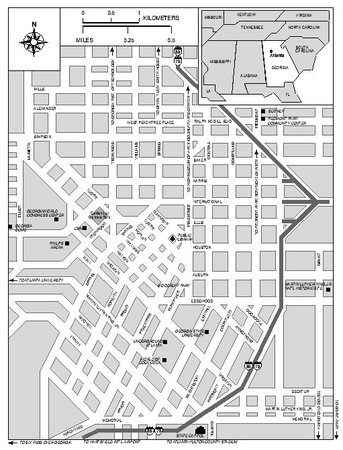Atlanta
Atlanta: Geography and Climate
Atlanta: History
Atlanta: Population Profile
Atlanta: Municipal Government
Atlanta: Economy
Atlanta: Education and Research
Atlanta: Health Care
Atlanta: Recreation
Atlanta: Convention Facilities
Atlanta: Transportation
Atlanta: Communications

The City in Brief
Founded: circa 1837 (incorporated as Marthasville, 1843; reincorporated 1847)
Head Official: Mayor Shirley Franklin (D) (since 2002)
City Population
1980: 425,022
1990: 393,929
2000: 416,474
2003 estimate: 423,019
Percent change, 1990–2000: 5.8%
U.S. rank in 1980: 29th
U.S. rank in 1990: 36th (State rank: 1st)
U.S. rank in 2000: 48th
Metropolitan Area Population
1980: 2,233,000
1990: 2,969,500
2000: 4,112,198
Percent change, 1990–2000: 38.9%
U.S. rank in 1980: 16th
U.S. rank in 1990: 12th
U.S. rank in 2000: 11th
Area: 132 square miles (2000)
Elevation: 1,010 feet above sea level
Average Annual Temperature: 64.2° F
Average Annual Precipitation: 50.77 inches
Major Economic Sectors: wholesale and retail trade, services, government
Unemployment Rate: 4.2% (December 2004)
Per Capita Income: $25,772 (1999)
2004 (3rd Quarter) ACCRA Average House Price: $247,229
2004 (3rd Quarter) ACCRA Cost of Living Index: 98.2 (U.S. average = 100.0)
2002 FBI Crime Index Total: 49,451
Major Colleges and Universities: Emory University, Georgia Institute of Technology, Atlanta University Center, Georgia State University
Daily Newspaper: Atlanta Journal-Constitution
